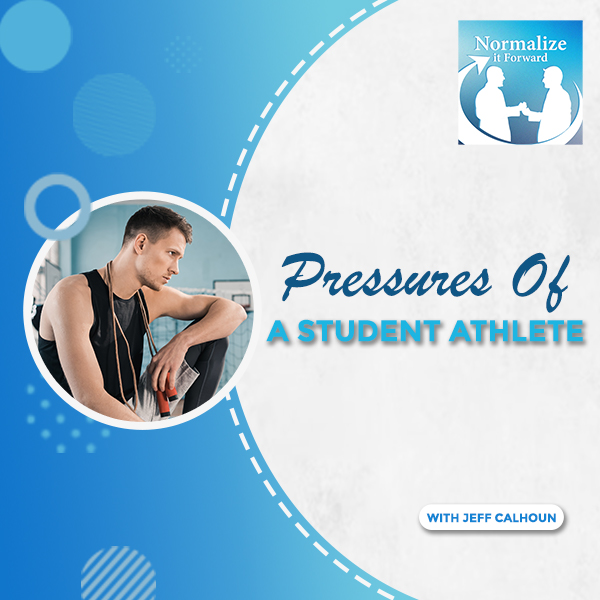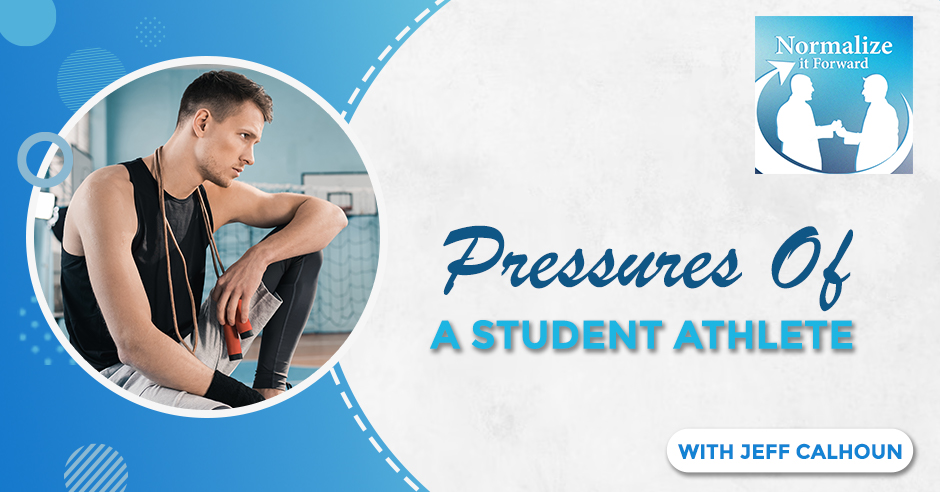
Every student athlete is burdened with the task of balancing work and play. They are expected to perform well in their academics and in the court, and most of the time, this pressure takes a huge toll on their mental health. Marc Lehman explores the right way to provide support to student with former basketball player and current coach Jeff Calhoun. Together, they emphasize the importance of normalizing conversation about mental health among young adults and how they should connect with their elders and fellow students about it. Jeff also explains why taking moments of tranquility is extremely needed in this constantly interconnected world that does not seem to know how to take a break.
—
Watch the episode here
Listen to the podcast here
Pressures Of A Student Athlete With Jeff Calhoun
In this episode, we are welcoming Jeff Calhoun. Jeff, thank you so much for joining us. I appreciate it. Jeff, in your college years in the early ‘90s, I know you had played for UConn for your father for several years and sustained a number of injuries over time. I certainly want to chat with you about that in a bit. Jeff spent the last several years as Senior Vice President at Wheels Up, a private aviation company. In 2023, he co-founded a company. Jeff, what’s the name of the company?
It’s a sports, lifestyle, and experience club based in New York City. Jeff also does some work for ESPN as a spotter in the booth during college football games and is the assistant coach of the men’s basketball team at the University of Saint Joe’s. Personally, Jeff is married with three daughters. Jeff, thank you so much for taking the time to join us. How are you?
I’m great. It’s good to see you again. We go back a long way.
Athletic Background
It’s lovely to reconnect and hear about all of the things that you’re doing. Jeff, I started this show to give young people the message of how important it is to talk about mental health and wellness and work at not avoiding the conversation. As you know, there’s so much going on with young people. Let’s go back for a minute to your younger and my younger days at UConn as an athlete coming up through the high school and the college system and your dad as a coach for many years. I want to ask, point of view-wise, what was that like many years ago being an athlete, both in high school and college? Are you able to capture that for us?
I was always very driven to advance my basketball career. I grew up in a basketball home and always had a dream of playing for my father. There’s a lot of pressure we put on ourselves to exceed. It’s one of those things. We all tend to focus on the losses, not the wins, which can be challenging, especially at that age. It hits kids at different places.
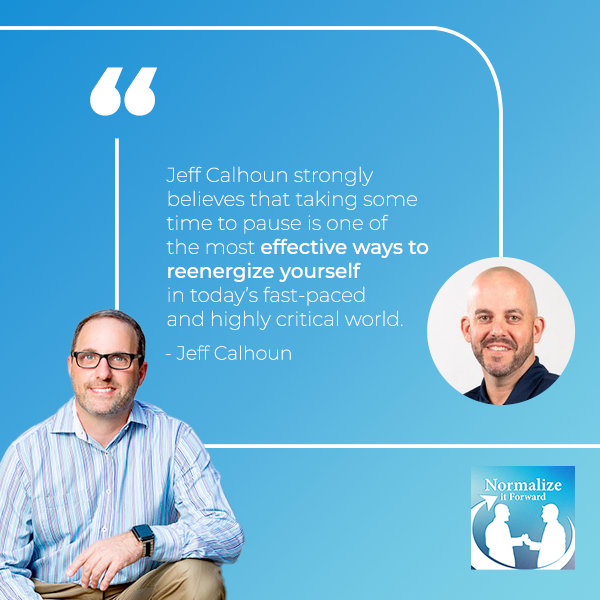
There was a pressure I put on myself for a long time where I knew I was one of the better players certainly in high school and things like that. As you get to a place like UConn, you’re not just playing, say, college sports but you’re playing the highest level of college sports. The struggles change, the pressure intensifies, and the expectations are difficult sometimes to meet. Balancing those can be a challenge.
Jeff, with the original son-coach combo, over the last few years, we were witnessing amazing things at UConn with Andrew and his dad. I can’t help but think as a fan, I’m excited for the year but I’m thinking about that word pressure. There’s an expectation here of wins and the National Championship. That couldn’t be a higher expectation for those players.
Pressure And Anxiety
It’s an immense pressure and expectation. I got to imagine for a young person, that pressure is above your pay grade at that age. It’s hard to understand. With NILs and everything, there’s a lot of finances involved as well. That’s an interesting segue. We talk about mental health and certainly on college campuses, anxiety and depression are at an all-time high. You’ve got three kiddos and have been through the college years with them as have I. It is a little scary as a parent to hear how intense it is.
Bridging those two points, for me, was always difficult. There was an added pressure certainly growing up in stores as my dad’s son. I was a recruited high school athlete. I had other options to go places similar to UConn. I knew going to UConn that it was going to be difficult. It’s funny. The things I thought would be a problem, maybe relationships with teammates and things like that didn’t end up being the problem. Things I didn’t see coming became a little bit more challenging for me.
As you look at what kids go through, I look back and feel very fortunate in some ways to not have had to deal with social media, some of the expectations, the internet, and all of these things where these kids can’t turn it off and they don’t have solace that I could find, whether it was going home, going to a friend’s house, or whatever it was. It could find a little bit of an oasis of calm and get away from it as best you can. Whether you’re an athlete or non-athlete student, there’s no escaping it. It never stops. It never gives you the ability to turn it off. I certainly have seen it with my kids how difficult it is.
You bring out a great point, which is peace in your day. We can certainly talk about how that happens. For lots of people, whether they’re young adults or older adults, we all need peace in our lives. Our phones are on all the time. We do have the option of turning them off. We just overlooked that option a lot. I try to point out to my patients, at least, the advantages of things that you can get on phones like meditative apps, for example. I can’t tell you how many college students I’ve worked with over the years who use Headspace, Calm, or other meditative apps. It’s great for kids to pop their earbuds in, listen to, and feel that peace. You’re right. It is hard, especially as an athlete. Athletes are constantly moving and always going.
It’s the pressure of a bad game or, “This isn’t going as well.” That’s typical. That happens to everybody, even the best players. Ray Allen and Donyell Marshall, who I played with, had their struggles. That’s not different for them than it was for me. There’s an audience out there who has a voice as to what’s going on with you and how you’re doing. It’s not always a kind or supportive voice. There are those people out there. I don’t want to overlook that but it’s easy to find the negativity.
It’s also easy for these kids to feel the pressure of it all, whether it’s the people they grew up with, their family, or the fans of the team. There are bumps in the road and you’re figuring it out. We live in a society where the results are expected and the criticism comes quickly. It’s challenging for these kids. As you added, also the money coming in on NIL. It’s dialed up where people feel more entitled. I’m sure kids feel much more pressure because they’re getting paid.
We currently live in an analysis society where results are expected and criticism comes quickly. Share on XI have to imagine the non-athlete or the typical kid who goes to school. I’ve been consulting at a private school in the area and I’m watching as my high school students are filling apps out. They’re transitioning to go off to college. With the non-athlete typical college kid, there’s still a ton of pressure and competitiveness around what school they’re going to. The concept of, “Are you going to be happy there,” seems to get lost. I asked that question. It’s almost like that’s not asked of the students themselves. Is that something you noticed with your kids?
A hundred percent. None of my kids are athletes in college. I feel like that completely. It’s much more of a style-over-substance conversation because they’re seeing other kids go to this or that school. With your age and my age, we were in this bubble where you knew the kids in your town and maybe some people from other places but there wasn’t this pressure of the entire country of kids trying to get in and say, “Look where I got in,” and this battle to get into these competitive schools, which has only gotten worse.
I can’t imagine with all the information that’s out there. To your point about the apps that are on the phone, there’s so much good information that’s come out of this where kids are so much more informed than we were but there is another side to that coin, which is all that pressure and expectation. Sometimes kids feel that rather than saying, “It’s going to work out regardless of where it is because I’m going to make it work out. This ends up being the place that I was meant to be at. Maybe this is the better fit for me,” rather than, “This is the place that looks best on my Instagram posts that I’m going to.”
Self-Care
I’m curious about your thoughts on this. As I alluded to, anxiety and depressive rates across the country are at an all-time high. For parents like us, it’s terrifying to know that suicide is the second leading cause of death in this age bracket. I used to tell parents, “That’s reported. It’s probably the number one because a lot of times it goes unreported.” It’s always terrifying to me when I hear stories like that but unfortunately, every few months, I hear about another one.
It leads me to think, what can parents and kids do? Beyond seeing a therapist, what are those things kids can do tangibly on campus that might be helpful? One of those big topic areas is self-care. Self-care is a phrase that’s been thrown around a lot in the last many years. I’m curious. When you think of self-care, Jeff, whether it’s your girls, yourself, or other people that you know, what does self-care mean to you?
Primarily for me, what first jumped into my mind when you asked the question is certainly when I was their age, I don’t think it was as accepted or normalized to talk about the way how you were doing that way. Not very loving parents couldn’t ask for better parents but I grew up in a home where this was probably me putting it on myself but being tough. Was this ideal that I tried to live up to? I tried to be as tough as possible. To me, I thought tough was like, “Look what I can take.” I’ve since learned that that’s not a way to describe toughness.
Toughness comes in a lot of forms, in much better and healthier forms than the way I had defined it. It’s being able to primarily recognize the way you’re feeling and finding a community, a therapist, friends, family, or a community where you feel comfortable talking about the way you’re feeling and being able to say, “I’m not doing great. I’m going through this or reaching out.” That’s a big piece of it. Getting back to what we had talked about previously, because the world doesn’t stop and it’s not, you don’t have the ability to turn it off. It’s finding that time to turn it off, settle, be at peace, and find some tranquility in this. No matter where you are, it’s always on and buzzing.
Find the time to turn off everything around you and be at peace. Find some tranquility in today’s chaos no matter where you are. Share on XYou made two good points I want to highlight. One is that conversation. It is the crux of why I created this show of people having conversations about mental health issues, whether it’s talked about in those terms or kids are talking about stress. I find it unbelievable that when I talk to college kids and say, “Have you talked to any of your friends about how your classes are going.” They’re like, “No.” No kids do that in college. Kids don’t talk about class.
There’s this huge chunk of stuff going on in kids’ worlds with academics that no one talks about with each other. Kids can feel a ton of pressure from classes not going well. They’re sitting with that alone. The classic freshman who thinks they studied enough to fail their first exam. They don’t tell anybody but they double down in their mind and they’re like, “I’ll do better on the next one.” That’s a formula for anxiety.
Normalizing the conversation and for kids to understand that there are adults, whether it be you and I, RAs, RDs, coaches, assistant coaches, teachers, or other professionals on campus that would understand, lend an ear, sit down, and have a conversation. It may not be able to help them solve things but they’ll certainly listen and be able to offer that to them.
Your second point, which is spot on, is for kids to find a place and a time in their schedule regularly to create some peace for themselves. As strange as it sounds, if I’m seeing patients all day long, sometimes I’ll go and have lunch at a park nearby to clear my head and get out of the office. Certainly, exercise is a big one for me in terms of clearing my head and getting the clutter out. As you can imagine, I might hear a few things during the week.
I’m sure for yourself as well, everybody’s got these busy schedules. Why should college kids’ lives be any different with creating that peace? I encourage kids regularly to find that, whatever it looks like for them. For some kids, working out is great. Other kids hate it. It’s finding something else that they might enjoy to help bring that stress level down. It’s a great suggestion.
I wish the kids knew. I had a conversation with one of my daughters about something like this, where it’s one of those things. It’s the burden of youth, thinking that if you’re going through it, you’re the only one who’s going through it. I’m trying to have that conversation with my daughter, “I promise you if you’re feeling this way, almost everybody around you is feeling this way too. Sometimes it’s not easy and I get that but sometimes, be pleasantly surprised if you had the vulnerability to tell somebody else that this is how you were feeling.”
A lesson I learned later in life is sharing the way I was feeling about things and finding that these people that I was very close to were going through the same thing on a parallel path. Neither one of us had ever talked to each other about it but finding that other person and finding that me telling my story helped them and me. Also, building a community of people who do listen, are there for you, and can understand what you’re going through.
Statistics support what you’re saying. One of the advantages in some ways to the majority of kids being anxious is you can say to yourself, “I’m not in the minority anymore. There’s a lot of kids out there.” It’s super good advice. It’s important for kids to hear that and realize it. You used the keyword vulnerability. If you can lean into that conversation a bit and say, “Have you been stressed about this class? I’ve been super stressed about it,” the conversation flows. I’m amazed at how many kids get to school, are super homesick, and never tell anybody around them how homesick they are. They’ll go to social media but they won’t tell kids around them. I joke, “Kids, you’d have to come from a pretty awful home to not miss something.”
Here’s a true story. My dorm room looked at my high school. I could see my high school from my dorm room window. My dad’s office was maybe a quarter mile from my dorm room. I saw him every day. My parents live 6 miles away. I was homesick. If I can be homesick, anybody can be homesick.
Memorable Mentors
That’s funny, Jeff. That’s an interesting transition to my next question for you. For so many adults I talked to, in our college and high school years, we had our mentors and people who would make suggestions. Maybe we’re able to, years later, look back and go, “That was helpful. That person had an impact on me.” It could have been someone that you least suspected in high school, a club coach of something, a friend’s parent, or certainly an advisor. Also, many coaches over the years with athletics, teachers, and all sorts of adults. I’m curious. As you look back as an adult, are you able to pull out one of those statements that somebody made to you that had an impact?
A couple of people but one specifically. We had our academic advisor for the basketball team at UConn. He was a professor of Biology at UConn. His name was Ted Taigen. He was a pretty well-known guy on campus. He’s a great person. As I battled through injuries, it put me in a pretty good depression, which I didn’t know I think what it was. I woke up one day and realized that I was not in a great place. I was having a tough time focusing on school.
He came to me and said that he noticed what was happening to me and lent an ear. He told me at the time, “You don’t have to stay in school if you don’t want to go to college and if that isn’t for you.” It wasn’t the path I ended up choosing but in a bigger conversation, those statements gave me the freedom to realize I don’t have to do all of this. If I do this, it’s because I want to do it and it’s right.
It was knowing that I didn’t have to stay on this path, people were there to help me, and people got it when I thought what I was going through was me. I had built a bubble. We talked about, “I’m the only one going through this. Nobody understands what it’s like to be me and what I’m going through.” “No, everybody has their challenges here and everybody’s dealing with something.” It helped me.
That’s an awesome story. Good for Ted for taking the steps to do that. I feel like for adults, that’s also a vulnerable decision like, “Do I say something? Do I not?” Not necessarily realizing how big of an impact that can have on a kid to say, “I see something’s going on. Here are some ideas and suggestions.” I like the way you put that. It sounds like it was a pivotal moment during your college years. Thank you for telling us that story, Jeff. I appreciate it.
Parenting Challenges
The life of a young person is hard. Equally, parenting young people has become challenging. When it comes to adding in things like mental health but even more generally, pressure, one of the hardest parts that I’ve experienced as a parent is seeing my kid feel that pressure and not being able to relieve it for them. How would you describe one of the challenges that you’ve experienced as a parent over the last many years of young adulthood?
It’s very similar to you. It’s seeing the anxiety that my kids have felt. The three girls each had their very unique challenges. I have felt it for very different reasons in very different ways. I realized that there’s a gap, not just in age but in technology and the world. It’s changed so much. What the world changed from my parents to me is not a fraction of what it’s changed from me to my girls.
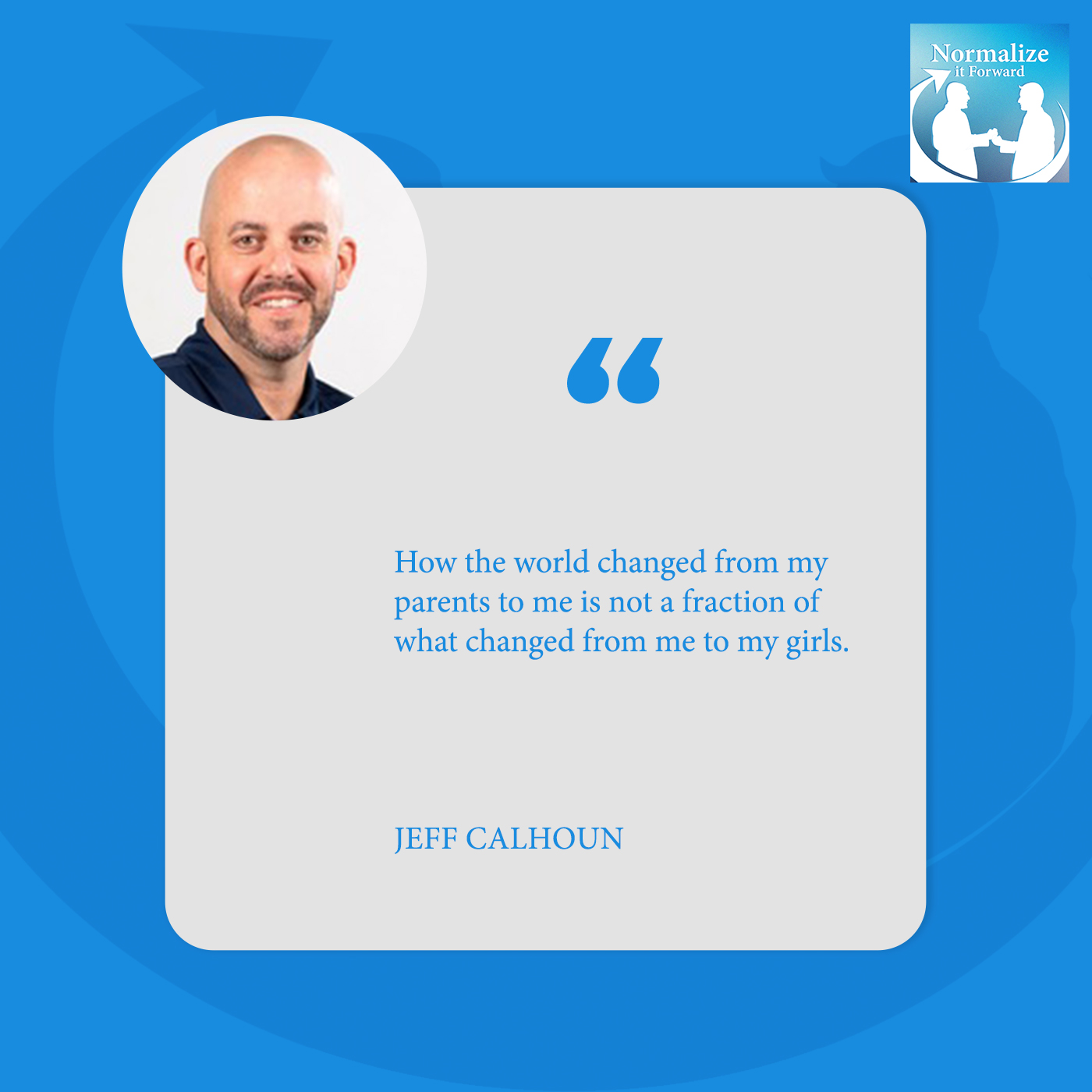
With all of that, I was feeling, I don’t want to say helpless but how much can I identify with what they’re going through? I do think having gone through it myself, having maybe the difference between our parents and our generation, was a little bit more understanding of these issues. We all came out of growing up maybe a little bit more in tune with mental health, anxiety, and the challenges. I’ve always made a conscious effort to not forget what it’s like to be their age because it’s hard.
For me, it’s always been important to let them know that I certainly don’t see myself as a finished product. They see me as somebody who has it together, has a job, has had some success, and has done things in their life but I wasn’t always that way. I let myself be vulnerable enough to tell them, “I made mistakes that you haven’t made. I made a lot worse mistakes than you made. I was in a very similar situation to you when I was your age.” I was letting them have the understanding that we’re not the adults who have all the answers and we were also like them.
Advice For Student Athletes
We’re human beings. We make mistakes. For you to be able to be that open and honest with your kids, I’m sure opens doors for them to be able to be open and honest back, Jeff. That’s smart. Let me ask you this. I want to put you on the spot for one second. My audience is not only parents but also students. I’m thinking that there will be athletes who might be reading this conversation. I know that in athletics, not only do you have several coaches but you have a whole bunch of support staff. You got your teammates. I’m wondering. Do you have any words of advice for an athlete going through it? Let’s say they’re feeling depressed or anxious. They’re not themselves. Any words of advice?
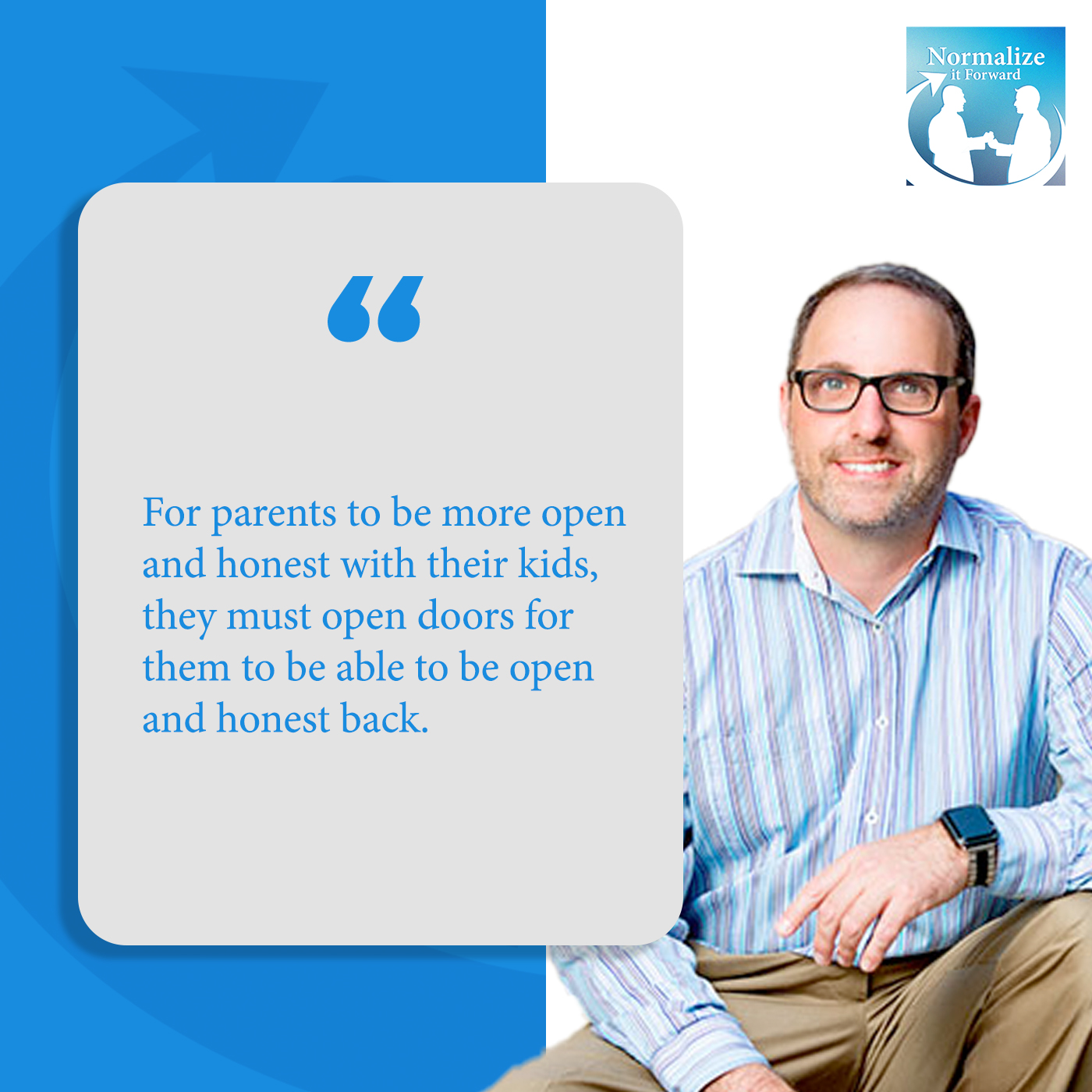
Reach out. Coaching to your point, there are enough people, hopefully on a staff, on a code or in support. There are resources for you. The vast majority of people are in coaching. I do it for free. I volunteer at Saint Joe’s. I love being around basketball but more importantly, I love being around the guys that I coach. The reward is the relationship.
For me, it’s being trusted by one of the kids who play for us with the way they’re feeling with what they’re going through. Most people are involved in this because they love being around kids and they want to help kids. Know that that’s there for you. To be vulnerable is not easy. I get it but by and large, you’ll always be pleasantly surprised when you do the way people will receive it. For some reason, you’re at a place where you don’t feel supported and you don’t have those people. I’d probably tell you you’re at the wrong place. There are not many of those out there but they do exist. If you find that, then it’s probably not the right place and you should leave.
If you are at a place where you do not feel supported, it is probably not the right place for you. Share on XGood suggestion. How’s the team looking in 2024?
We’re going to be good. We’ve been very fortunate. We’ve had good players and kids. We started with fifteen freshmen. It was a school that didn’t have men. In the first year, they had men. We had a team. Within three years, we had the number one team in the country. We’ve had good success. We’re trying to build on it but it should be an interesting year.
Episode Wrap-up
Good luck to them and you. One of the unique parts of this show is we ask for the conversation to continue. You and I will continue to talk offline about individuals who perhaps might be good guests in the future, Jeff. I want to thank you for your time. I know you’re super busy. I appreciate you making some space and allowing us to reconnect about such an important topic. Thank you so much for being here.
Thanks for having me. I appreciate it.
Jeff, you have a great day. We’ll talk soon.
You too.
Important Links

